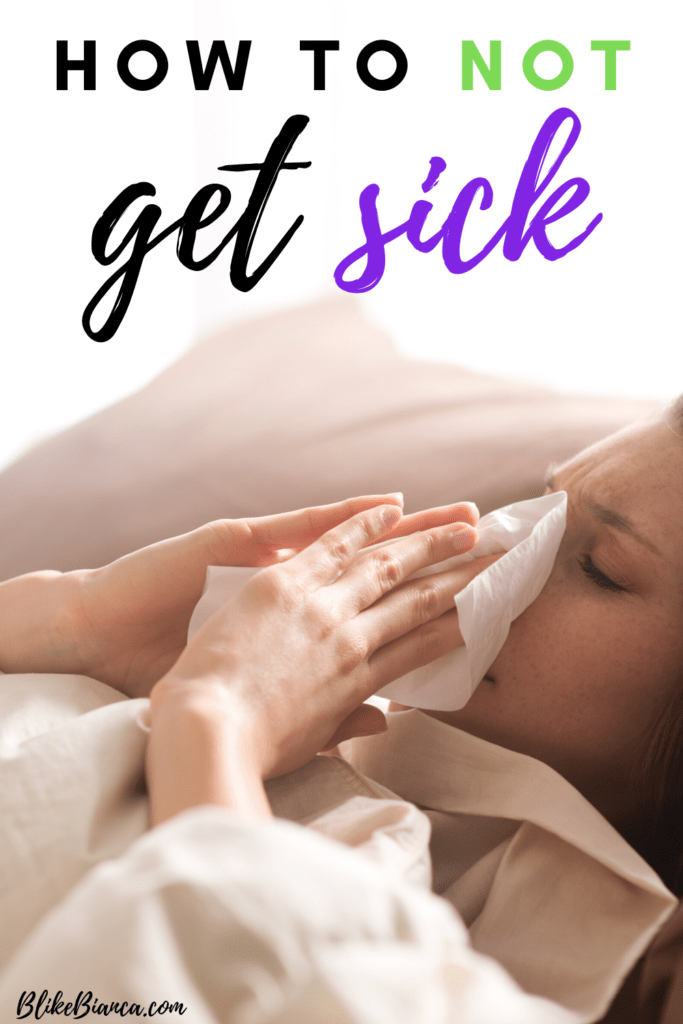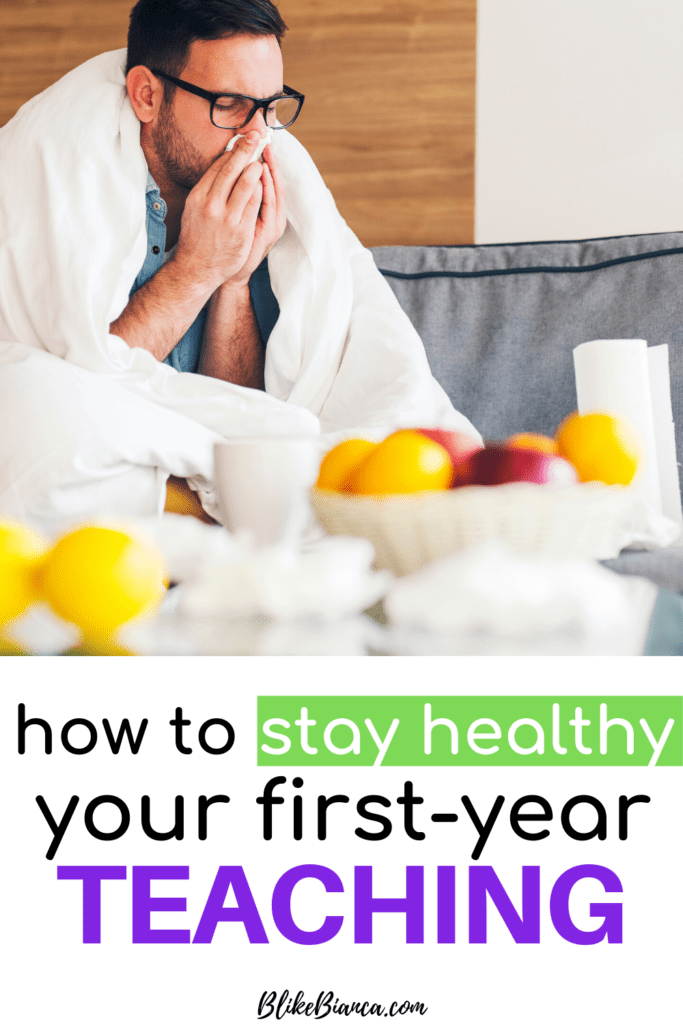This post may contain affiliate links. If you make a purchase, I may receive a small commission at no cost to you. Thank you!
Before all the increased worries and scares of getting sick with COVID-19, I started writing this blog post. This was almost a month ago.
I was upset because I spent a day of my President’s Day weekend home with a fever. I easily wanted to blame my students…or even more the parents. You see, this school year I have been sick almost every single month with some sort of cold. It was usually a few days after I notice one or more of my students sick while at school. When I ask them why they didn’t stay home, they say, “I wanted to, but my mom made me.”
I’ve heard this from at least 5 different students. Usually when I do, I have them go see the nurse. I know a phone call from the school nurse to a parent/guardian will reaffirm that their child really is sick.
But I know it is more than just my students, but a lot of other factors lowering my immune system. I have asthma and allergies and I’m in a new environment. I’m at a new district and the building I’m in is pretty old. As a matter of fact, it is getting demolished after our last day of the school year.
Whatever the case, this flu season, with COVID-19 Coronavirus, I need to make sure I’m healthy and practice getting my immune system up.

5 Ways to Stay Healthy
With cold and flu season underway, and the pandemic of COVID-19, we all want to do what we can to avoid getting sick. Unlike bacterial infections that can quickly be cleared up with a round of antibiotics, with sicknesses caused by viruses like the flu or the common cold, you often have to ride it out. While there are medications that can help ease your symptoms, your immune system must fight the viral infection off. Why not take it easy on your body and do what you can to avoid catching it in the first place.
1. Use Good Hand Hygiene
Your first line of defense to avoid getting sick is simple – Wash Your Hands. That’s right. The simple act of washing your hands frequently with soap and hot water limits the spread of cold and flu viruses and your chance of coming down with them. Get in the habit of washing your hands whenever you’ve been out in public, and whenever you can throughout the workday. Wash them before you eat or drink food and when hot water and soap aren’t available, use an alcohol-based hand sanitizer.
Why is this so important? Because you are more likely to pick those viruses up with your hands than any other way. Sure, having a sick student cough in your face doesn’t help, but your chances of getting the flu or coming down with the common cold thanks to contact with a handrail or doorknob are much higher. You pick the virus up by moving about your day. It’s now on your hands, which isn’t a big problem by itself. It can’t enter through the skin there.
The problem arises when you touch your face. It happens a lot more than most of us are aware of. We touch our nose, rub our eyes, or get our fingers too close to our mouth when we eat or cough. The virus makes it to a mucous membrane in any of those areas and it’s right where it wants to be.
That’s why it’s important to wash your hands. It isn’t some busy work that healthcare professionals give you to make you feel like there’s something you can do. It is your best line of defense. So, what are you waiting for? Go wash your hands.
2. Eat Plenty of Fresh Fruits and Vegetables
All systems of your body work best when they are properly fed. This includes your immune system. Stick to a mainly whole foods-based diet that includes plenty of fresh fruits and vegetables. If you feel like you might be a little under the weather or suspect that you may have come into contact with someone sick, increasing your intake of Vitamin C may help as well. Eat a few citrus fruits. Broccoli, cauliflower, and kale are other great options.
I have also found that taking a Vitamin D supplement and Vitamin C supplement really have worked well. Although I have been under the weather quite a bit this school year, I noticed if I just took a combination of these two supplements together I would be back at work the following day.
If you do find yourself not feeling well, try to avoid eating processed foods. It takes a lot of time and effort to digest them and you don’t want to weigh your body down with extra work when that energy could be used to boost your immune system, keep you from getting sick, or help you get well sooner. Overall, your diet is a key factor in keeping your health intact.

3. Get Some Exercise
In addition to eating well, get out there and get regular exercise. For best results, work out in the fresh air. Something as simple as a daily quick walk can help you stay well and strengthen your body. It has the added benefit of helping you to de-stress. I don’t have to tell you that you’re more likely to get sick when you are stressed out. Use daily exercise to de-stress and stay well. It will also help you with the last way to boost your immune system.
Simple Ways to Sneak More Exercise into Your Day
One of the biggest reasons why people don’t exercise is time. But just changing a few habits will help you keep your body strong to fight off viruses. An easy way to start is to incorporate a brisk daily walk. If you are like me, in the classroom I walk and pace constantly. I know some of our classroom equipment doesn’t set us up to stay mobile, but I do my best.
My school building has hallways that are all connected, so during my plan, I will take a few laps around the school. When the weather is nice, I will go out and play a game of softball or kickball with students during P.E. Better yet, if your students have recess, hang for just 15 minutes a day and play four-square! The kids will love this! It is also a great connection/relationship tool.
Another option many find helpful is to wear a pedometer or fitness tracker, I bought an Amazfit. They are low cost, sync with an app, and they stay charged for days. You can monitor your daily step count for a few days and then start to increase it until you get to the recommended 10,000 steps – or challenge yourself to do even more.
To motivate myself, I bought a treadmill and some kettlebells. Where I live in the rainy Pacific Northwest, it’s difficult to keep myself active outdoors (I don’t like being cold) so I would always find excuses to not go outside, but now, I have nothing to hold me back.
But you really don’t need any fancy equipment. Use can use your body weight for resistance and grab some cans to use as weights. Of course, if you’re feeling ultra motivated, you may also choose to join a gym or hire a personal trainer to help you get into a good workout routine.
4. Keeping Your Distance
As much as possible, keep your distance from people who are coughing and sneezing. Turns out that the average cold or flu virus only travels about six feet through the air. That means if you can keep a little bit of distance between yourself and anyone that looks like they are sick, you improve your chances of staying healthy.
Of course, that’s easier said than done. For us teachers, we are in some pretty tight spaces, and we end up stuck in the classroom with a sick student who didn’t stay home frequently. But try to keep your distance or send students to the nurse.
The best thing to do is to use your influence to encourage students to stay home when they are sick. Remind parents through email or newsletter correspondence to keep sick children home and send students to the nurse. As well as lead by example. Stay home and avoid heading out anywhere when you are sick. If you have to venture out, keep your distance and wear a mask. Don’t sneeze or cough into your hands. Use hand sanitizer before touching common use items like the keypad at the grocery store or door handles, or if you have to, just wear disposable gloves.
5. Make Time for Sleep
This last tip is easy to skip over, yet it is the most important one for most of us and the one that can give your immune system a great boost. It’s getting enough sleep. Make the time to get seven to eight hours of sleep each night. Practice good sleep hygiene. Don’t let the word scare you. It means turning off your phone and other screens a few hours before bed. Keep your bedroom calm, quiet, and at a temperature that encourages sleep. It also includes establishing and sticking to a bedtime routine. As an added bonus, you’ll feel more energized for everything else you have to do all day.
The times when you have not gotten enough rest your immune system is down. That is why if you had a bout of insomnia, or, you were caring for a sick child, those are times when you were more likely to catch a cold or come down with the flu or a stomach bug.
On the flip side, making sure you get plenty of quality sleep can serve as a sort of insurance policy. It strengthens your immune system and helps your body fight off any type of infection or threat that comes its way. In addition, your body will be able to heal itself faster should you come down with something if you get plenty of rest. That’s why your doctor often orders plenty of rest and fluids when you have a cold.

Final Thoughts
Between the healthy food you’re eating, the sleep, and the exercise you’re getting, you’ll start to feel better, get stronger, and become healthier. As a result, your immune system will be in a better position to protect you from whatever cold and flu season sends your way.
Do you have any home remedy tips that keep you from getting sick? Comment below and share our tips!

These are all great ideas. I usually make sure my kiddos get their fruit and veggies in and forget about myself. Story of my life, lol. Hopefully, I’ll focus on my intake a little more while still getting the kids to eat right. Exercise is so not my friend, but I am finding ways like walking to get into flow. I hope you and your family are well and staying safe. Thanks for the share!
Thank your for stopping by and lovely comment! I know how you feel, sometimes we are go-go-go while taking care of everybody but ourselves. Hang in there and I hope you and your family well too!
Great tips.
Thank you. I will share it with my readers.
Awesome! Thank you for stopping by!